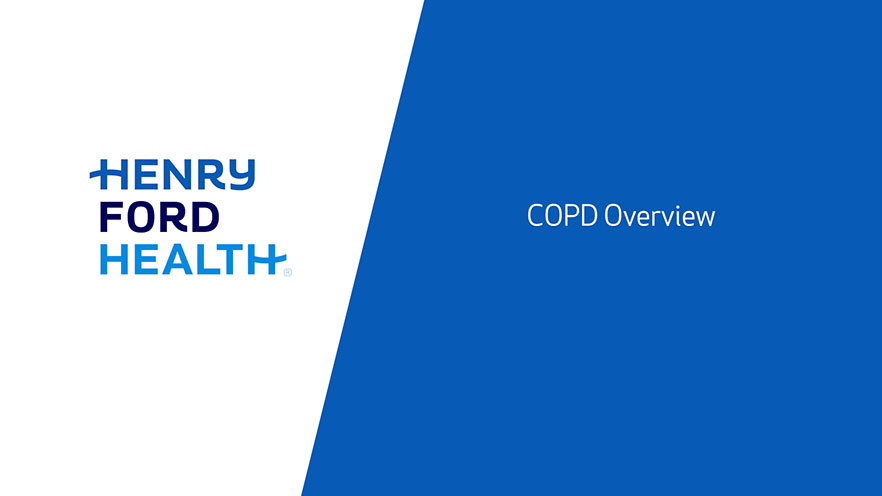COPD Overview
Chronic Obstructive Pulmonary Disease (COPD)
Chronic obstructive pulmonary disease (COPD) refers to various lung disorders, including emphysema and chronic bronchitis. Like most pulmonary (lung and breathing) conditions, COPD makes it difficult to breathe. Over time, it causes lung tissue to deteriorate.
COPD is very common. It affects about 30 million people in the U.S. — and many of them don’t know they have it. Henry Ford Health offers careful, individualized diagnosis to identify the cause of your symptoms. Then we customize treatments to ease chest tightness and help you breathe again, so you can get back to enjoying life.
Your Lung Health Questions Answered

Why choose Henry Ford for COPD care?
We offer exceptional care for people with COPD and other obstructive lung diseases. U.S. News & World Report ranks us as “high-performing” for COPD care. This designation assures you that our outcomes and treatment practices are excellent. We provide care you won’t find everywhere, including:
- Personalized screening and treatment: You’re more than your condition — and your care should be equally unique. We don’t put everyone with COPD on the same inhaler regimen. Instead, we tailor everything from your initial evaluation through your treatment plan to meet your needs. We’ll educate you about the disease and find a solution that works for you. Learn more about what to expect.
- Comprehensive lung team: Our pulmonary specialists are experts in diagnosing and treating COPD and work to return you to your active life. We are also national leaders in the research of new COPD therapies. Meet our pulmonary team.
- Pharmacist in-clinic: Sometimes, feeling better is a matter of having the right medication. Our expert respiratory pharmacist joins our doctors to discuss patients and learn what has and hasn’t worked for them. As a result, you are more likely to get medications that will work for you. And we’ll make sure you know how to use them to your best advantage.
- Research and clinical trials: Henry Ford participates in clinical treatment trials for COPD. This means you have access to the latest treatments. We’re also doing research into questions like how depression impacts people with COPD and how to best care for patients who have both conditions.
What are the types of COPD?
COPD is a general term that refers to a group of conditions where the lung’s passages become blocked (obstructive lung diseases). These conditions include:
- Chronic bronchitis: Chronic bronchitis is a long-term cough with mucus. As it continues, the mucus build-up and irritation can damage your airways.
- Emphysema: Often caused by smoking or exposure to environmental pollutants, emphysema is one of the most common types of COPD. People with emphysema experience increasing lung damage over time.
- Refractory asthma: Allergies, dust or chemicals in your environment can cause coughing and wheezing. When medicine doesn’t work to treat asthma, doctors call it refractory or non-reversible asthma.
- Bronchiectasis: When airways are injured, they might not clear out mucus correctly. This condition, known as bronchiectasis, can affect how well you can breathe. A medical condition or an injury can cause bronchiectasis. Sometimes it develops because of cystic fibrosis, a chronic lung disease that some people are born with.
How do doctors identify COPD?
Doctors use pulmonary function tests to diagnose COPD. Pulmonary testing is generally painless. The first step is usually spirometry. This means you blow through a tube so we can track how much air you take in and breathe out.
Your doctor will also ask about your symptoms. The symptoms of COPD include:
- Shortness of breath that gets worse over time (progressive)
- Wheezing
- Coughing
- Excess phlegm or mucus
COPD treatment at Henry Ford
Henry Ford offers COPD treatments that aren’t readily available. We also provide options that have had proven success over many years. Your doctor may recommend some combination of:
- Quitting smoking: The leading cause of COPD is smoking. Stopping smoking is the most effective — and important — COPD treatment. Henry Ford Tobacco Treatment Services provides several methods to help you quit.
- Preventing infection: Infections like the flu and pneumonia can worsen COPD symptoms. Your team will recommend vaccinations to reduce the likelihood of a lung infection.
- Medications: These include inhaled bronchodilators (medicines to open the airways) and inhaled steroids.
- Endobronchial valve procedure: This nonsurgical treatment makes breathing easier for you. It involves implanting tiny valves in the lungs during a bronchoscopy. The valves make breathing less strained by blocking the diseased parts of the lung from taking in air and allowing the healthier parts to expand more fully and work more efficiently. The result is better lung function. Learn more about Endobronchial valve procedure.
- Pulmonary rehabilitation: Our fitness center offers supervised exercise programs to help relieve COPD symptoms. You’ll work with a group of people who have similar symptoms and experiences. You can support each other while you build endurance. Learn more about pulmonary rehabilitation.
- Lung volume reduction surgery (LVRS): Some patients with severe COPD have symptoms that we can’t control with medication. LVRS can offer relief. We offer open-chest surgery and thoracoscopic LVRS (using small incisions). Our lung specialists and thoracic surgeons work very closely to deliver LVRS. Find out more about lung volume reduction surgery.
- Lung transplantation: In some cases, the only option is a lung transplant. This surgery provides a new lung from a donor so you can breathe again. Our lung transplant program is very active, with excellent outcomes. Read more about lung transplant.

Lung Cancer Screening Program
Lung cancer screening has shown that we can detect cancer much earlier in people most at risk.
.svg?iar=0&hash=F6049510E33E4E6D8196C26CCC0A64A4)

/hfh-logo-main--white.svg?iar=0&hash=ED491CBFADFB7670FAE94559C98D7798)
